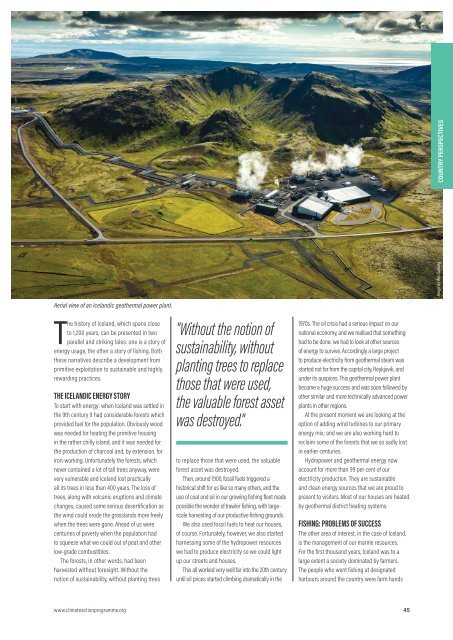Climate Action 2016-2017
You also want an ePaper? Increase the reach of your titles
YUMPU automatically turns print PDFs into web optimized ePapers that Google loves.
Image by Árni Sæberg.<br />
COUNTRY PERSPECTIVES<br />
Aerial view of an Icelandic geothermal power plant.<br />
The history of Iceland, which spans close<br />
to 1,200 years, can be presented in two<br />
parallel and striking tales: one is a story of<br />
energy usage, the other a story of fishing. Both<br />
these narratives describe a development from<br />
primitive exploitation to sustainable and highly<br />
rewarding practices.<br />
THE ICELANDIC ENERGY STORY<br />
To start with energy: when Iceland was settled in<br />
the 9th century it had considerable forests which<br />
provided fuel for the population. Obviously wood<br />
was needed for heating the primitive housing<br />
in the rather chilly island, and it was needed for<br />
the production of charcoal and, by extension, for<br />
iron-working. Unfortunately the forests, which<br />
never contained a lot of tall trees anyway, were<br />
very vulnerable and Iceland lost practically<br />
all its trees in less than 400 years. The loss of<br />
trees, along with volcanic eruptions and climate<br />
changes, caused some serious desertification as<br />
the wind could erode the grasslands more freely<br />
when the trees were gone. Ahead of us were<br />
centuries of poverty when the population had<br />
to squeeze what we could out of peat and other<br />
low-grade combustibles.<br />
The forests, in other words, had been<br />
harvested without foresight. Without the<br />
notion of sustainability, without planting trees<br />
"Without the notion of<br />
sustainability, without<br />
planting trees to replace<br />
those that were used,<br />
the valuable forest asset<br />
was destroyed."<br />
to replace those that were used, the valuable<br />
forest asset was destroyed.<br />
Then, around 1900, fossil fuels triggered a<br />
historical shift for us like so many others, and the<br />
use of coal and oil in our growing fishing fleet made<br />
possible the wonder of trawler fishing, with largescale<br />
harvesting of our productive fishing grounds.<br />
We also used fossil fuels to heat our houses,<br />
of course. Fortunately, however, we also started<br />
harnessing some of the hydropower resources<br />
we had to produce electricity so we could light<br />
up our streets and houses.<br />
This all worked very well far into the 20th century<br />
until oil prices started climbing dramatically in the<br />
1970s. The oil crisis had a serious impact on our<br />
national economy, and we realised that something<br />
had to be done: we had to look at other sources<br />
of energy to survive. Accordingly a large project<br />
to produce electricity from geothermal steam was<br />
started not far from the capital city, Reykjavik, and<br />
under its auspices. This geothermal power plant<br />
became a huge success and was soon followed by<br />
other similar and more technically advanced power<br />
plants in other regions.<br />
At the present moment we are looking at the<br />
option of adding wind turbines to our primary<br />
energy mix; and we are also working hard to<br />
reclaim some of the forests that we so sadly lost<br />
in earlier centuries.<br />
Hydropower and geothermal energy now<br />
account for more than 99 per cent of our<br />
electricity production. They are sustainable<br />
and clean energy sources that we are proud to<br />
present to visitors. Most of our houses are heated<br />
by geothermal district heating systems.<br />
FISHING: PROBLEMS OF SUCCESS<br />
The other area of interest, in the case of Iceland,<br />
is the management of our marine resources.<br />
For the first thousand years, Iceland was to a<br />
large extent a society dominated by farmers.<br />
The people who went fishing at designated<br />
harbours around the country were farm hands<br />
www.climateactionprogramme.org 45












